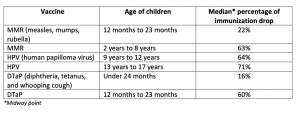Drop in Childhood Vaccines; National Immunization Month 2021
July 29, 2021
This August’s National Immunization Month is more important than it has been for a long time. Self-isolation and lockdowns since early 2020 contributed to a drop in routine childhood vaccines. Experts are worried that these immunization delays could cause a surge of preventable childhood diseases, especially once children are back at school.
The Centers of Disease Control and Prevention (CDC) reported one study that showed “sharp declines in routine childhood vaccine administration” in 10 jurisdictions in the months following the COVID-19 pandemic declaration. These 10 areas are usually “high performing” when it comes to childhood immunizations.
The study covered two periods. The first period covered March to May 2000, when eight of the 10 jurisdictions had stay-at-home orders. The second covered June to September 2020, as offices and businesses were reopening.
Doctor’s Offices Closed
The most common reason for the drop in routine vaccinations was the lack of doctor or nurse practitioner availability. At the beginning of the pandemic, many offices and clinics restricted the types of patients they saw, usually only seeing very ill children or ones that needed hands-on follow-up care. Some restricted their patients by age, with the younger children receiving their first vaccine doses. Since older children weren’t coming to the office, they didn’t receive their scheduled boosters.
But even when doctors were available, some parents were reluctant to bring their children to see a healthcare professional for fear of potentially exposing the children to COVID-19. And if their children weren’t sick, particularly if they weren’t going to school or daycare, parents may have felt that vaccinations could wait and they were not a priority.
An example of some rates compared with two years ago:

The Blue Cross Blue Shield Association predicted these significant drops as well. In a report published in November 2020, they wrote, “According to the new BCBSA data, 40% of parents and legal guardians say their children missed vaccinations due to the pandemic. Most vaccination postponements occurred during two key time periods. The first was in March through May, when the pandemic was first taking hold. Then, in August, the typical spike in back-to-school vaccinations largely failed to occur because of the pandemic’s impact and the shift to virtual schooling options in districts across the country.”
Catching Up with Childhood Vaccines
There is good news though. Despite the significant dip earlier in the year, the CDC study found that parents were bringing their children back for routine childhood vaccines later. The second period numbers were closer to pre-pandemic levels. Healthcare professionals are still concerned about reaching children who missed their routine doses and catching up though.
According to a recent Washington Post article, “We have been playing catch-up for the last year, and we still see patients coming in who have not seen us in more than 18 months, which means many of them are behind on vaccines,” said Jason Terk, a pediatrician in Fort Worth, Texas.
Terk pointed out in the article that “even the smallest decline in vaccination coverage can compromise herd immunity and lead to outbreaks.” He used the example of a 2018/2019 measles outbreak in the state of New York. For herd immunity to exist against childhood diseases, there needs to be close to 95% vaccination rates. In Rockland County, N.Y., and surrounding areas, vaccinations against measles had dropped to 77 percent, triggering an outbreak.
Reducing Infection Risk for Children and Adults
Sepsis can be caused by any kind of infection, including those that may be prevented by routine childhood vaccines and others. The CDC has published charts that list the various vaccines (initial and booster) for different age groups:
The only way to prevent sepsis is to prevent infection from occurring in the first place. If your child has missed any routine childhood vaccines, consider making an appointment for them as soon as possible to catch up. It could save a life.
If you do contract an infection, it’s important to watch for signs of sepsis:

Vaccines save lives.





























